
Nettle, often overlooked as just a pesky weed, is in fact a highly nutritious and beneficial herb that can be a great addition to your diet, much like spinach. Rich in vitamins and minerals, nettle has numerous health benefits, but handling it requires some caution due to its stinging hairs. Here’s why edible nettle is considered superior to spinach and how to safely harvest and prepare it.
Nutritional Benefits of Nettle: Nettle is packed with nutrients that surpass those found in spinach, making it an excellent dietary choice. It contains high levels of:
- Vitamins: Nettle is rich in vitamins A, C, K, and several B vitamins.
- Minerals: It boasts a high content of iron, magnesium, phosphorus, potassium, and calcium.
- Protein: Nettle is unusually high in protein for a leafy green.
- Antioxidants: The plant provides a good source of phenols, which have strong antioxidant properties to combat free radicals in the body.
Who Should Pick Nettle? Picking nettle with bare hands is generally not recommended due to the plant’s fine hairs that can inject histamines and other chemicals, causing stinging, redness, and irritation. However, experienced foragers who are not allergic or sensitive to these chemicals sometimes choose to pick nettle bare-handed to quickly and efficiently harvest the plant. They often develop a tolerance to the sting over time.
Safe Handling Tips: For most people, especially those new to handling nettle, it’s important to take precautions:
- Wear Gloves: Protect your hands with gardening gloves or similar protective wear.
- Use Scissors or Clippers: Cut the plant carefully to avoid direct contact with the skin.
- Choose Young Plants: Young nettle leaves are more tender and less stringy than older ones, and they typically have a milder sting.
Preparing Nettle for Consumption: Once harvested, nettle can be prepared in a way that removes its stinging ability:
- Blanching: Boil the nettle leaves for a few minutes in water, which destroys the stinging hairs.
- Cooking: Nettle can be used similarly to spinach in recipes. It can be added to soups, stews, smoothies, or sautéed as a side dish.
- Drying: Nettle leaves can be dried and used as a tea or seasoning, providing a nutrient boost without any stinging risk.
Who Should Avoid Nettle? While nettle is generally safe for most people, certain individuals should exercise caution or avoid it:
- Those on Blood Thinners: Nettle can affect blood clotting due to its high vitamin K content.
- Pregnant Women: Due to its potential effect on hormonal and menstrual cycles, pregnant women should consult with a healthcare provider before consuming nettle.
- People with Kidney Issues: The high potassium content in nettle might pose risks for those with kidney disorders.
Conclusion: Edible nettle offers remarkable nutritional benefits that can surpass those of spinach, making it a valuable addition to a healthy diet. By understanding how to handle and prepare this plant safely, you can enjoy all the health benefits it has to offer without the discomfort of its sting.




